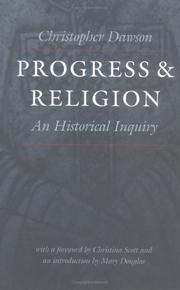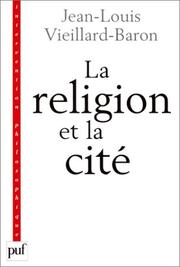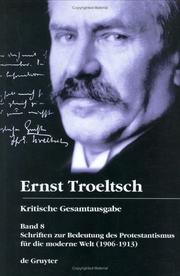| Listing 1 - 10 of 43 | << page >> |
Sort by
|
Book
ISBN: 3666557996 Year: 2023 Publisher: Göttingen : Vandenhoeck & Ruprecht,
Abstract | Keywords | Export | Availability | Bookmark
 Loading...
Loading...Choose an application
- Reference Manager
- EndNote
- RefWorks (Direct export to RefWorks)
Der enzyklopadische Aspekt der Barthschen Theologie, also ihr Anspruch, von der Dogmatik aus allen ubrigen Disziplinen mit in den Blick zu bekommen, ist von der Forschung bisher selten reflektiert worden. Dies kann erstaunen, befindet sich die Theologie heute, was ihre Einheit und die wechselseitige Bezogenheit ihrer Teildisziplinen angeht, doch in einer prekaren Lage. Durch die zunehmende "Verfachwissenschaftlichung" entfernen sich die Facher immer mehr voneinander. Disziplinubergreifende Bemuhungen um die Einheit der Theologie werden nicht oft unternommen, sind aber - auch um der kirchlichen und religiosen Praxis willen - unerlasslich.Karl Barth hat mit seiner christozentrischen Offenbarungstheologie den Anspruch eines genuin theologischen Zusammenhangs der theologischen Facher verbunden, der sich weder auf ein einheitliches philosophisches Bezugsparadigma noch auf einen spezifischen Religionsbegriff grundet. Die Beitrage des Bandes bedenken die vielfach monierten Schwachen dieses Ansatzes, aber auch seine Starken, und zwar im Blick auf gegenwartige Theologie.
Religion and civilization. --- Civilization and religion --- Civilization

ISBN: 0813218195 9780813218199 9780813210155 0813210151 Year: 2001 Publisher: Washington, District of Columbia
Abstract | Keywords | Export | Availability | Bookmark
 Loading...
Loading...Choose an application
- Reference Manager
- EndNote
- RefWorks (Direct export to RefWorks)
History --- Religion and civilization. --- History, Modern --- Civilization and religion --- Civilization --- Philosophy. --- Philosophy
Book
ISBN: 9004281843 9789004281844 9789004281837 9004281835 1322223408 Year: 2014 Publisher: Boston
Abstract | Keywords | Export | Availability | Bookmark
 Loading...
Loading...Choose an application
- Reference Manager
- EndNote
- RefWorks (Direct export to RefWorks)
In today’s society, a positive relation between ‘God’ and ‘civilization’ is by no means self-evident. Religious believers who want to live their lives in accordance with ‘the law of God’ are often considered a threat to civilization. To many, monotheistic religion is inherently repressive and violent. The central aim of this volume is to think of both God and civilization in a more open, space-giving way. God is seen as the One who prevents man from making an absolute claim for a relative reality, including one's religion and culture. The multifaceted relations between God and civilization are explored from systematic-theological, missiological, philosophical and ethical perspectives.
Religion and civilization. --- God. --- Metaphysics --- Misotheism --- Theism --- Civilization and religion --- Civilization --- Religion et civilisation --- Dieu
Book
ISBN: 081322134X 9780813221342 9780813221335 0813221331 Year: 2013 Publisher: Washington, D.C.
Abstract | Keywords | Export | Availability | Bookmark
 Loading...
Loading...Choose an application
- Reference Manager
- EndNote
- RefWorks (Direct export to RefWorks)
Religion. --- Religion and civilization. --- Civilization and religion --- Civilization --- Religion, Primitive --- Atheism --- Irreligion --- Religions --- Theology

ISBN: 2130504744 9782130504740 Year: 2001 Publisher: Paris PUF
Abstract | Keywords | Export | Availability | Bookmark
 Loading...
Loading...Choose an application
- Reference Manager
- EndNote
- RefWorks (Direct export to RefWorks)
Religion --- Religion and sociology --- Sociologie religieuse --- Philosophy --- Philosophie --- Religion and civilization. --- Philosophy. --- Religion and civilization --- Civilization and religion --- Civilization --- Religion - Philosophy.

ISBN: 3110171562 3110876973 9783110171563 Year: 2001 Volume: 8 Publisher: Berlin de Gruyter
Abstract | Keywords | Export | Availability | Bookmark
 Loading...
Loading...Choose an application
- Reference Manager
- EndNote
- RefWorks (Direct export to RefWorks)
A critical edition of the text of the famous lecture on the significance of Protestantism for the genesis of the modern world (1906/1911), together with further texts on the cultural significance of Lutheranism and Calvinism from the same period. Der berühmte Vortrag Die Bedeutung des Protestantismus für die Entstehung der modernen Welt (1906/1911) sowie weitere Texte zur Kulturbedeutung von Luthertum und Calvinismus aus der gleichen Zeit werden hier in einer textkritischen Edition vorgelegt. In die Auseinandersetzung um die Bedeutung des Protestantismus für die Entstehung der Moderne hat Troeltsch zusammen mit Max Weber im ersten Jahrzehnt des vorigen Jahrhunderts nachdrücklich eingegriffen. Die in diesem Band vereinigten Beiträge haben eine intensive Diskussion ausgelöst, von der die konfessions- und kulturgeschichtliche Forschung bis heute bestimmt ist.
Protestantisme. Protestantse sekten --- Civilization, Modern --- Protestantism --- Religion and civilization --- 284 --- Civilization and religion --- Civilization --- Church history --- Modern civilization --- Modernity --- Renaissance --- History --- Religion and civilization. --- Civilization, Modern. --- History.
Book
ISBN: 2895443319 1435698789 9781435698789 9782895443315 Year: 2007 Publisher: Québec Éditions MultiMondes
Abstract | Keywords | Export | Availability | Bookmark
 Loading...
Loading...Choose an application
- Reference Manager
- EndNote
- RefWorks (Direct export to RefWorks)
Religion and civilization. --- Religious education. --- Religious pluralism. --- Pluralism (Religion) --- Pluralism --- Religion --- Religions --- Ethical education --- Theological education --- Education --- Moral education --- Civilization and religion --- Civilization
Book
ISBN: 9004263144 9789004263147 9789004263130 9004263136 1322223564 Year: 2014 Publisher: Leiden
Abstract | Keywords | Export | Availability | Bookmark
 Loading...
Loading...Choose an application
- Reference Manager
- EndNote
- RefWorks (Direct export to RefWorks)
The Dialectics of the Religious and the Secular: Studies on the Future of Religion contains the work of fifteen international scholars who have wrestled with the question of the relevancy, meaning, and future of religion within the context of the increasing antagonisms between the religious and secular realms of modern civil society and its globalization. Through their chosen topics in analyzing these issues in the 20th and 21st centuries, each author also indicates the possibility of mitigating if not preventing the continuation of this antagonism by historically moving toward a more reconciled and humane future global society. Contributors are: Branko Ančić, Aleksandra Baranova, Roland T. Boer, Francis Brassard, Dustin Byrd, Donald Devon III, Neven Duvnjak, Jan W. R. Fennema, Denis R. Janz, Dinka Marinović Jerolimov, Gottfried Küenzlen, Mislav Kukoč, Michael R. Ott, Rudolf J. Siebert, and Ivica Sokol.
Religion --- Religions --- Religion and civilization. --- Civilization and religion --- Civilization --- Interreligious relations --- Relations among religions --- Philosophy. --- Relations. --- Religion and civilization --- Religion et civilisation --- Philosophy --- Relations --- Philosophie
Book
ISBN: 9811990522 9811990514 Year: 2023 Publisher: Singapore : Palgrave Macmillan,
Abstract | Keywords | Export | Availability | Bookmark
 Loading...
Loading...Choose an application
- Reference Manager
- EndNote
- RefWorks (Direct export to RefWorks)
This books explores the rise of civilizational populism throughout the world, and its consequences. Civilizational populism posits that democracy ought to be based upon enacting the ‘people’s will’, yet it adds a new and troubling dimension to populism’s thin ideology: a civilization based classification of peoples and division of society. Today, we increasingly find not conflict between civilizations, but conflict within states over their civilizational identity. From Western Europe to Turkey, and from India and Pakistan to Indonesia, populists are increasingly employing a civilization based classification of peoples in order to define the identities of ‘the people’ and their perceived enemies. This book is the first to examine civilizational populism as global phenomenon rather than a uniquely Western form of politics. Through a series of case studies, the book examines the role played by religion in forming civilizational identities, but also investigates the often deleterious consequences of civilizational populism entering the political mainstream. Prof. Ihsan Yilmaz is the Research Chair of Islamic Studies at the Alfred Deakin Institute for Citizenship and Globalisation, Deakin University, Melbourne, Australia. He is the author of many books, including most recently published Populist and Pro-Violence State Religion: The Diyanet’s Construction of Erdoğanist Islam in Turkey (2022) and Creating the Desired Citizen: Ideology, State and Islam in Turkey (2021). Dr. Nicholas Morieson is a Research Fellow at the Alfred Deakin Institute for Citizenship and Globalisation, Deakin University, Melbourne, Australia, and has previously worked as a lecturer at Australian Catholic University, Melbourne. He is the author of Religion and the Populist Radical Right: Secular Christianism and Populism in Western Europe (2021).
Group identity. --- Populism --- Religion and civilization. --- Religious aspects. --- Civilization and religion --- Civilization --- Collective identity --- Community identity --- Cultural identity --- Social identity --- Identity (Psychology) --- Social psychology --- Collective memory
Book
ISBN: 9783110254365 3110254360 9783110254372 3110369532 3110254379 9783112188927 3112188926 9783110369533 Year: 2014 Publisher: Berlin De Gruyter
Abstract | Keywords | Export | Availability | Bookmark
 Loading...
Loading...Choose an application
- Reference Manager
- EndNote
- RefWorks (Direct export to RefWorks)
This volume focuses on religion from a trans-cultural and international perspective. Its aim is to open up new perspectives on how religions might coexist peacefully within 21st century societies and simultaneously contribute to global pacification. Can a religion cope peacefully with the existence of other religions, without having to abandon its own claim to truth, and if so, what already inherent, specific characteristics would have to be emphasized? Or is secular culture the path to convince different religions of a shared ideal of peaceful co-existence? These questions are approached considering the socio-political implications of religions in Asian, African, Latin-American and European contexts.This collection of essays reflects on the entire spectrum of the highly topical and complex academic discussions pertaining to the interrelation of society, state and religion. One example in this collection features the analysis of a secular state engaging in dialog with Muslim communities through a state-moderated communication platform; another article concentrates on the political impact of Christian churches on Nigerian society by means of political advertisement. Moreover, the different concepts of religion in Western societies are considered: one essay argues that in democratic societies it is the state that must guarantee the freedom of religion and thereby provide the basis for a peaceful co-existence between all religions.
Religion and civilization. --- 316:2 --- Civilization and religion --- Civilization --- Godsdienstsociologie --- 316:2 Godsdienstsociologie --- Religious pluralism. --- Religions --- Interreligious relations --- Relations among religions --- Pluralism (Religion) --- Pluralism --- Religion --- Relations. --- Religion and civilization
| Listing 1 - 10 of 43 | << page >> |
Sort by
|

 Search
Search Feedback
Feedback About UniCat
About UniCat  Help
Help News
News